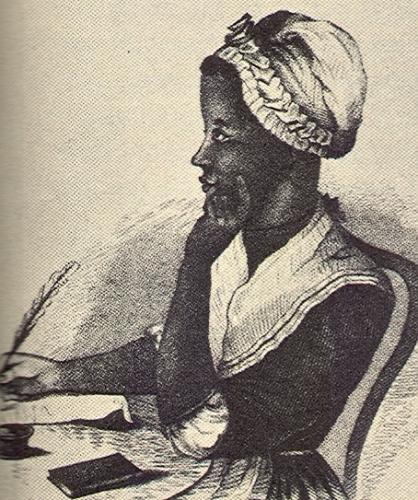 |
LITR 4231 Early American
Literature Sample Research Posts 2014 (research post assignment) Research Post 2 |
 |
Brandi Polvado
April 18, 2014
Benefits of Double Language
While discussing the topic of slavery this semester in Early American
Literature we studied some types of slave narrative poetry in which the author
could be using double language to get more than one meaning across to the
reader. Reading such slave
narrative poetry raised the question in my mind of why double language was used,
and also why was double language so important.
In a time period where many did not have a voice to fully express
themselves double language was used to say the things that authors truly wanted
to say but were unable to because of social status.
In several other literature classes the topic of double language is a
debated one because so many authors claim to be writing on one topic, or from
one perspective, but their text suggests something entirely different.
If one is going to be a writer then it is ideal to write about the topic
they find interesting and the thought of disguising the message they are trying
to relate seems ridiculous, but was often necessary during certain time periods.
The topic of double language was discussed in our Early American Literature
class after reading and studying a slave narrative poem by Phillis Wheatley
called, “On Being Brought From Africa to America.”
This poem is a short account of Wheatley’s experience as she journeyed
from Africa to America, and the tone of this poem can be seen from two different
viewpoints with two different meanings.
Because Wheatley is a slave and cannot speak freely about the hardships
she faces, she uses double language to disguise and convey the message she is
really trying to deliver. One
reader might see this poem as a form of gratitude from being rescued out of her
land and shown “mercy” and given an opportunity at salvation, but the tone of
the poem also suggests another meaning.
This poem can also be seen as a metaphor of the judgments and cruel
treatment that slaves faces as a result of the color of their skin.
These people were forcing the slaves to America for their benefit and
disguising it as an act of mercy.
This poem uses double language to expose the reality of the hypocrisy shown to
slaves because of the color of their skin.
If Christians are to love each other as themselves then they were hardly
showing mercy, even though this poem can be seen as saying they were.
Another form of double language we discussed in our Early American Literature
class can be seen in another slave narrative poem by Phillis Wheatley called,
“On Imagination.” She is the same
author of the first poem, however in this poem we see almost an escape from
reality from the author. Not only
is double language used to give a voice to the people who do not have one, but
it is also important because it allows the author to create a fantasy world in
which they can escape their own harsh reality.
In this poem Wheatley takes the reader on a journey through her
imagination, and we can see the happy memories and hopes that she has in life.
Given her social status and standing she can take a journey that she can
in no other way take through her writing.
She also uses imagery and makes her visions come to life, and it is
beautifully written. Perhaps at the
time of writing this, the poem gave Wheatley hope and happiness during tough
times. This type of double language
is important because it is an escape that was probably much needed by Wheatley.
Double language is a beautiful thing because it gives a voice and an opportunity
to be heard to people who normally would not have that opportunity.
Double language allows freedom of speech and the right to be heard to
those who were not given the equal opportunities they deserved.
There are so many different types of double language, and it is seen
throughout many different forms of literature.
It can be seen by male authors who are writing in support of equal rights
for women, women authors who are writing in support of equal rights for
themselves, and even in this case slave narratives written by authors who wanted
to shine a light on the harsh reality of the lifestyle slaves truly endured.
Double language is used to express viewpoints that were not allowed to be
expressed and even offered an escape from a harsh reality there was no other way
to escape. Interpretation has
always been up to the reader in any form of writing.
Just as one might hear a song and think it is conveying one message,
another may hear the same song and take away from it something entirely
different. It is interesting to see
so many authors being questions about their writings and what they meant, and
have the opportunity to disguise their true intentions on why or what they
intended to write about. Double
language is an empowering tool used to show two different realities of topics
otherwise not talked about.
|
|
|
|

